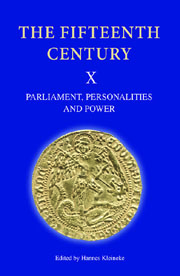Book contents
- Frontmatter
- Contents
- List of Illustrations
- Contributors
- Acknowledgements
- Preface
- Abbreviations
- The People and Parliament in Fifteenth-Century England
- ‘A Beest envenymed thorough … covetize’: an Imposter Pilgrim and the Disputed Descent of the Manor of Dodford, 1306-1481
- Henry Inglose: A Hard Man to Please
- London Merchants and the Borromei Bank in the 1430s: the Role of Local Credit Networks
- ‘Mischieviously Slewen’: John, Lord Scrope, the Dukes of Norfolk and Suffolk, and the Murder of Henry Howard in 1446
- A Fifteenth-Century Medicus Politicus: John Somerset, Physician to Henry VI
- ‘Domine Salvum Fac Regem’: The Origin of ‘God Save the King’ in the Reign of Henry VI
- ‘Monuments of Honour’: Clerks, Histories and Heroes in the London Livery Companies
- The East Anglian Parliamentary Elections of 1461
- Changing Perceptions of the Soldier in Late Medieval England
- Thomas More, the London Charterhouse and Richard III
- Index
- Tabula Gratulatoria
The East Anglian Parliamentary Elections of 1461
Published online by Cambridge University Press: 05 February 2013
- Frontmatter
- Contents
- List of Illustrations
- Contributors
- Acknowledgements
- Preface
- Abbreviations
- The People and Parliament in Fifteenth-Century England
- ‘A Beest envenymed thorough … covetize’: an Imposter Pilgrim and the Disputed Descent of the Manor of Dodford, 1306-1481
- Henry Inglose: A Hard Man to Please
- London Merchants and the Borromei Bank in the 1430s: the Role of Local Credit Networks
- ‘Mischieviously Slewen’: John, Lord Scrope, the Dukes of Norfolk and Suffolk, and the Murder of Henry Howard in 1446
- A Fifteenth-Century Medicus Politicus: John Somerset, Physician to Henry VI
- ‘Domine Salvum Fac Regem’: The Origin of ‘God Save the King’ in the Reign of Henry VI
- ‘Monuments of Honour’: Clerks, Histories and Heroes in the London Livery Companies
- The East Anglian Parliamentary Elections of 1461
- Changing Perceptions of the Soldier in Late Medieval England
- Thomas More, the London Charterhouse and Richard III
- Index
- Tabula Gratulatoria
Summary
In the aftermath of the decisive battle of Towton, fought on Palm Sunday (29 March) 1461, King Edward IV remained at York for several weeks, before moving north to Durham and Newcastle. Only in May did he set out for the south-east and the capital once more, but at a leisurely pace and taking in some of the western midlands. He had thus only reached Manchester when on 23 May he issued writs for a parliament to be held at Westminster in July, probably with a view to put in place a permanent constitutional settlement. The parliament called in Henry VI's name in July 1460 had disbanded, probably in some disarray, in the wake of the arrival of Queen Margaret's forces before the gates of London in February 1461, and fresh elections were thus needed. The practice of seeking parliamentary sanction for the successive changes of dynasty and ruler that marked the history of fifteenth-century England had been begun by Henry IV in 1399, and had been readopted in the political crisis of 1460–1. It could be expected that the new parliament would be asked to lend its authority to Edward IV's assumption of the crown, to attaint the leading adherents of Henry VI and his son, Prince Edward, but also to begin to make good the new king's promise to redress the grievances of the realm. Yet, Lancastrian resistance in the provinces proved stronger than expected, and even before King Edward returned to his capital it was clear that he would need to make further progresses during the summer.
- Type
- Chapter
- Information
- The Fifteenth Century XParliament, Personalities and Power - Papers Presented to Linda S. Clark, pp. 167 - 188Publisher: Boydell & BrewerPrint publication year: 2011

